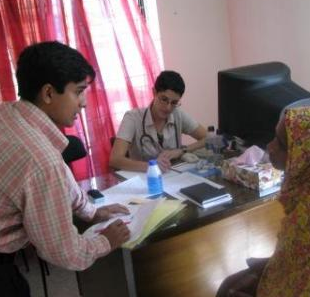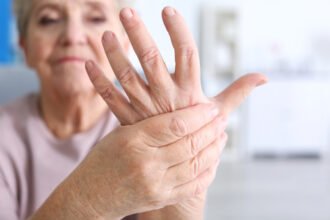

Cancer kills more people than HIV/AIDS, TB and malaria combined, and the rate is higher in low- and middle-income countries (LMICs) since most patients have advanced stage disease when first diagnosed. Moreover, in countries like Bangladesh, community health workers (CHWs) are not connected with mainstream healthcare facilities or trained healthcare personnel. As a result, providing healthcare education and primary services at community-level become quite expensive and impossible. However, the existing social taboos among the rural villages regarding breast cancer issues also refrain most of the women to expose their breast cancer conditions to their own community members. So, empowering CHWs for case-finding, motivating, tracking of patients and following-up with them throughout the entire care cycle may be one approach to changing these situations.

Study
Currently, most of the CHWs conduct household visits and collect patients’ data using paper records, which is not convenient to provide timely and targeted interventions by expert doctors sitting at a rural hospital. Hence, mPower Social, in partnership with Women’s College Hospital, University of Toronto and Amader Gram, Bangladesh, tested the effectiveness and efficacy of using mobile phone-based tools to support CHWs in rural Bangladesh in identifying women with breast cancer. The CHWs would map households in villages and visit, interview and examine as many women as possible to collect demographic data and specific data about breast problems.
CHWs attended a 2 day training course covering breast anatomy and physiology, common pathologies and cancer: presentations, diagnosis, treatments and curability. They also took part in role-playing techniques to address such issues as: poverty, husband or mother in law proscription, travel/religious proscription, and child care. The CHWs were then technically trained in the use of cell phone software applications. They then visited households and collected data using mobile phones. Data was collected manually (by paper) and also by mobile phones for comparison purposes.

When a CHW found a woman with a serious problem, she would urge her to seek care at the Amader Gram Breast Center in Khulna, listen to her concerns about seeking care and address them, and offer to travel with her to the center. Travel expenses would be paid. Although breast cancer is relatively rare in LMCs such as Bangladesh, the mortality is high since most women afflicted are first seen when the disease is in its final stages.
A motivational video was also offered to those afflicted with breast problems to test feasibility of this medium to get women into care for serious breast issues. The video was on the CHW’s mobile phone and was shown to the woman during the visit:
CHWs visited 8 villages and saw 3,147 women. Data collection was done both manually and with cell phones. While manual data entry took about 13 minutes; cell phone data collection took about 8 minutes. Data entry errors (patient and household identification) occurred in 20% of the cell phone cases and 45% of the manual cases. There were 80% of omission errors in the manual cases and 0 cases of omission errors in the cell phone cases. [With the cell phone application, every question had to be answered or exiting the case entry was impossible].

Ten women were found to have breast abnormalities and 5 were seen at the Amader Gram Breast Center. One woman was found to have stage III breast cancer.
Discussion
The findings here are of practical importance in addressing the challenges of breast cancer in this low income country. First, cell phone data entry can be used by CHWs effectively and is shown to be quicker (less time spent in data collection) and more effective (less errors) than manual entry. Second, contrary to expectations, there is negligible reluctance to report breast issues. Third, the low rate of breast cancer is this population is confirmed.
Overall, this study seems to prove that cell phone technology can be a useful and efficient tool and can be used by community health workers with greater accuracy than paper recorded data.
The following video highlighting this project won the Grand Challenges Canada Competition:
To read other posts in this exclusive ongoing series, please visit the Mobile Health Around the Globe main page.
And if you have a Mobile Health Around the Globe story to tell, please email me at joan@socialmediatoday.com








